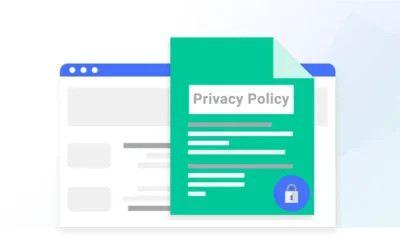

A website’s privacy policy outlines if and how you collect, use, share, or sell your visitors’ personal information and is required under data privacy laws.
Using a privacy policy template helps jump-start the process of making one of these essential legal documents for your site.
Keep reading to learn more about privacy policies, why you need one for your website, see some examples, and download our free privacy policy template.
Key Takeaways
Here’s a summary of everything you need to know about privacy policy templates:
If you want a privacy policy that’s tailored specifically to your website, our free privacy policy generator will create one for you in minutes.
You can download our free privacy policy template below in Word Doc, PDF, or Google Doc format. You can also just copy & paste the HTML directly to your website.
To use it, read through the entire privacy policy template and fill in all of the [brackets] with relevant details about your business; remove any sections that do not apply to your app.
You can tweak any language as needed.
Last updated [Date]
This privacy notice for [Company Name] (doing business as [Company Short Name] ) ("Company," "we," "us," or "our"), describes how and why we might collect, store, use, and/or share ("process") your information when you use our services ("Services"), such as when you:
Skip the hassle and use our free privacy policy generator to create a policy instead.
A privacy policy is a legal document on your website that informs users about how you collect and handle their personal data, who you share it with, if you sell it, what rights they have over it, and any other relevant details.
You might also call a privacy policy a:
Some specific platforms or services may require a unique privacy policy template, for example:
However, a standard privacy policy template will likely satisfy user demands and legal requirements for your website.
A simple privacy policy outlines the following information:
If you use a template, remember that your final privacy policy should also be clear to read, thorough, and easy for internet users to find.
Businesses need a privacy policy to comply with data privacy laws, to meet third party service requirements, and to build trust with consumers.
Privacy laws exist around the globe, and your website or app must abide by the legislation depending on factors like where you’re located, where your customers come from, and how much data you track.
Some of the laws that dictate if and when you legally need a privacy policy page for your website or app include:
Penalties for violating these laws include significant fines, criminal penalties, and damage to brand reputations.
Fortunately, our legal team keeps our comprehensive privacy policy template up to date to help you meet the guidelines of new and evolving data privacy laws.
Third party services often require the people using their tools to also have a compliant privacy policy as part of their terms of use agreements.
Some examples of third-party services that require you to have a privacy policy include:
Additionally, your privacy policy should clearly state what third parties can access user data and explain how and why the information is shared.
Using a template can help you meet these third-party service requirements.
Privacy is a primary concern for modern consumers — people want to know what information websites are collecting about them and what it’s used for.
For example, 48% of users have stopped buying from a company over privacy concerns, according to Tableau.
And the Global Consumer State of Mind Report 2021 revealed that 60% of users say they would spend more money with a brand they trust to handle their information responsibly.
Making a precise and easy-to-understand privacy policy using a template ultimately builds trust between your company and the user so they feel secure while visiting your website or using your app.
You can download our free website privacy policy template above to quickly customize a professional and accurate policy for your business.
Next, I’ll walk you through all of the most common privacy policy clauses and present you with several samples that appear in a boilerplate privacy policy.
Every website privacy policy needs an intro section that explains who you are, what the policy is for, and who and what it applies to. A good template will have this section available for you to fill in yourself.
To build transparency with your users, I recommend including some contact information and a table of content up front.
Take a look at the graphic below for an example of a privacy policy introduction clause.
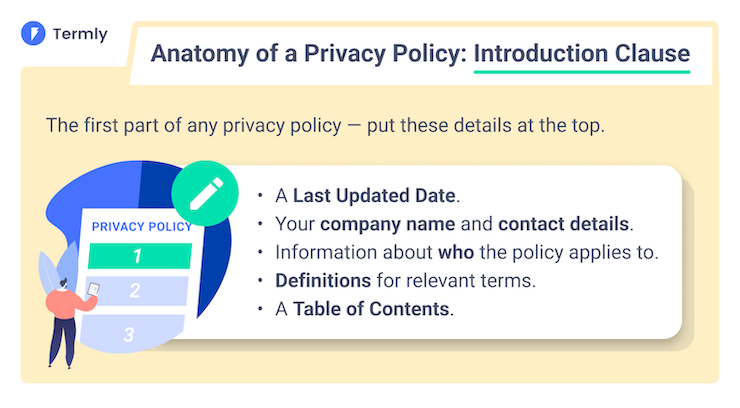
Under privacy laws like the GDPR and CCPA, users have the right to know what data you collect from them and how it gets used, making this a legally necessary clause.
Reliable privacy policy templates will account for this and include a section for you to list out all personal data your business collects in a properly formatted way.
As shown in the sample graphic of this privacy policy clause below, personal data includes details like full names, email addresses, phone numbers, and categories of sensitive information.
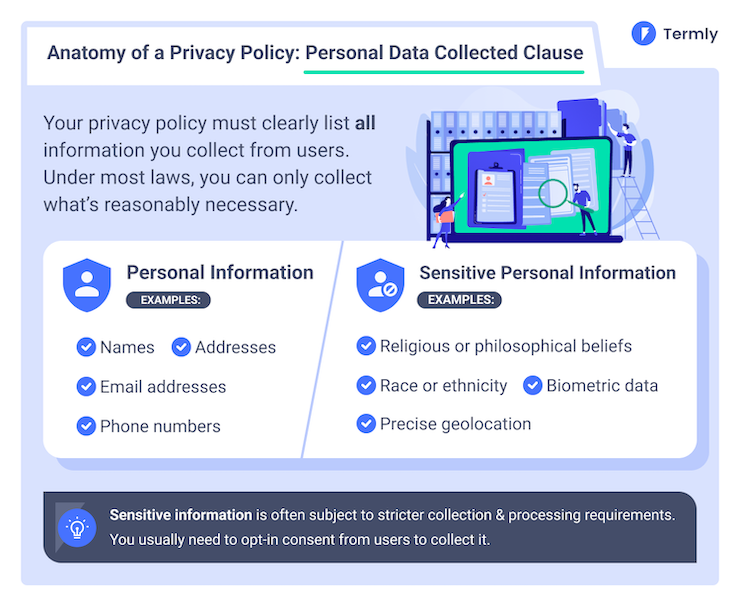
Businesses under specific privacy laws must inform users about why their data gets used, making this a critical clause in your website’s privacy policy.
A good privacy policy template will have a section available where you can transparently explain what you do with the information you collect.
For example, your business might use it to create a user account, display personalized content based on user interests, conduct research and analysis, or send order confirmations.
See more samples of what goes into this privacy policy clause in the graphic below.
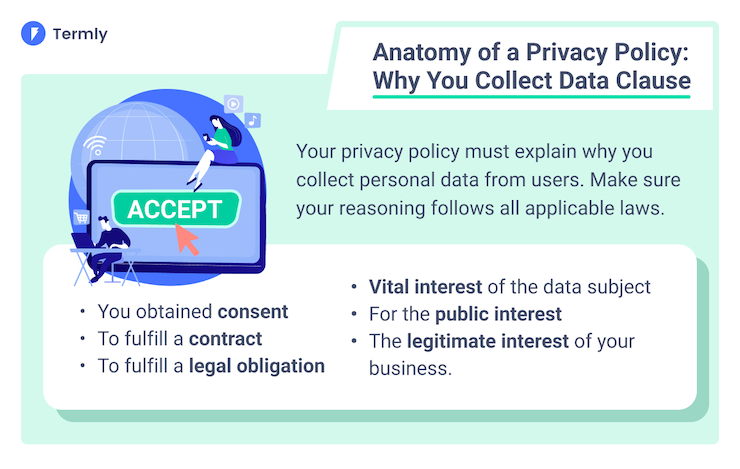
Most data privacy laws have stipulations outlining that businesses are responsible for protecting user data from cybersecurity breaches.
A reputable privacy policy template will have a clause available where you can describe the details about the security measures your company follows to keep consumer data safe, like using firewalls or encryption methods.
See more samples of what goes into this privacy policy clause in the graphic below.
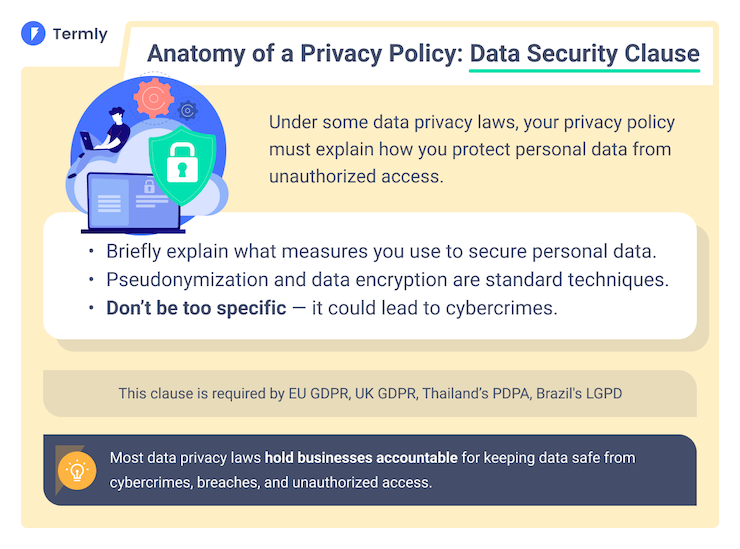
Your privacy policy must disclose any sharing of user data with third parties, as required by several different data privacy laws, so make sure you’re using a template that has this clause available for you to customize.
See a sample of the details that should go in this clause in the graphic below.
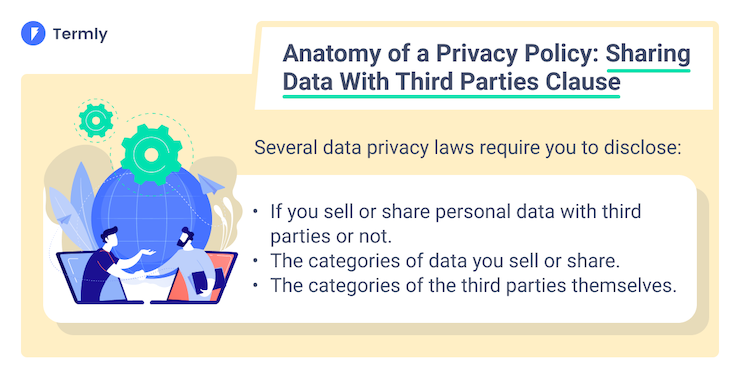
Cookies are considered personal data under laws most data privacy laws, so you’ll need a clause in your privacy policy outlining which ones you use, why, and what rights and controls users have over them.
A good template will have a cookies and other trackers section available for you to fill out.
Below, see how a sample of how Uber plainly describes their cookie usage, with relevant links to their cookie policy, directly in their privacy policy page.
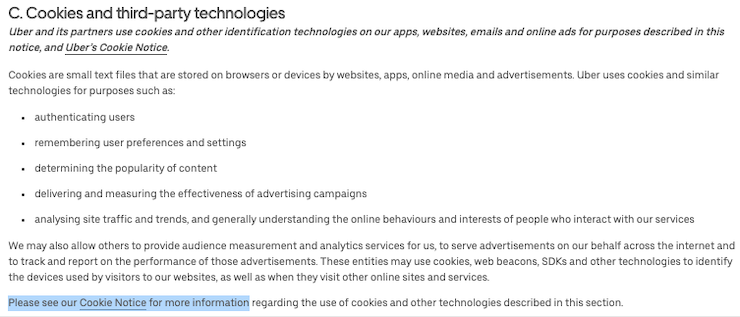
For more information and tips on ensuring your website or app is legally using cookies, read our guide on cookie compliance.
Different laws outline data privacy rights consumers can legally act on, and you’re required to include a clause in your privacy policy informing users about what their rights are and how they can act on them.
Some privacy policy templates might have sections available for different laws, or you can add in your own as necessary.
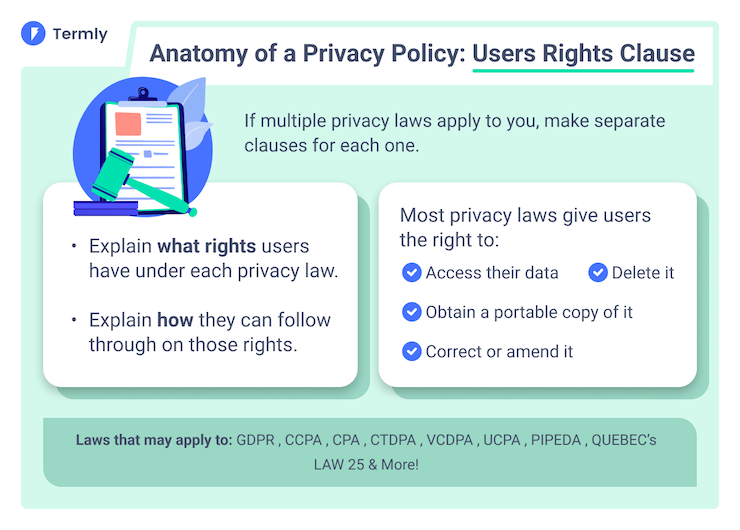
If you transfer data you’ve collected internationally, make sure you use a template that allows you to insert a business transfer clause into your privacy policy.
Doing so is essential because many privacy laws, including the GDPR, limit transferring personal data outside the country unless the other country has appropriate safeguards or is considered safe.
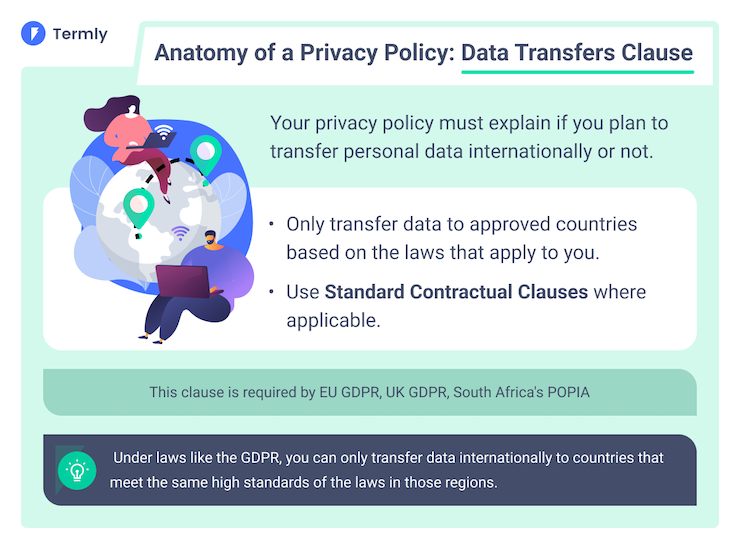
Some privacy laws require you to explain your data retention policy in your privacy policy, so find a template that has this clause available for you to edit.
Most privacy laws only permit you to store data for as long as necessary to achieve the purposes for the processing as disclosed to users, unless longer retention is required by law.
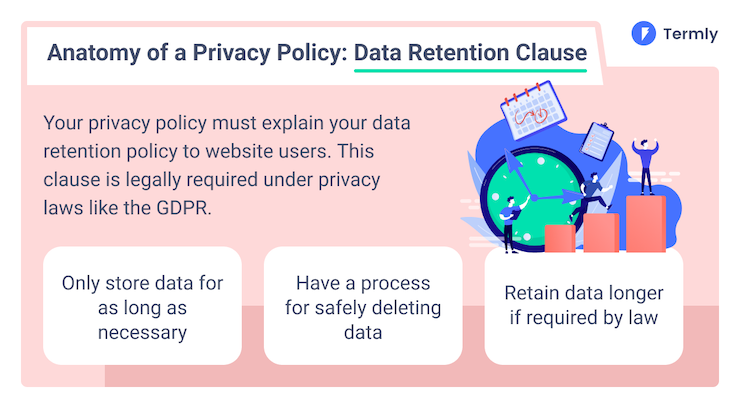
If you collect information from minors under 13, you must follow additional regulations in adherence with laws like COPPA and include a clause in your privacy policy expressing how you use the information and the rights and controls legal guardians retain over that data.
Even if you don’t collect data from children, you still need to inform legal guardians how to contact you if they believe you’ve wrongfully collected details about their child, so double check that the template you use has this information.
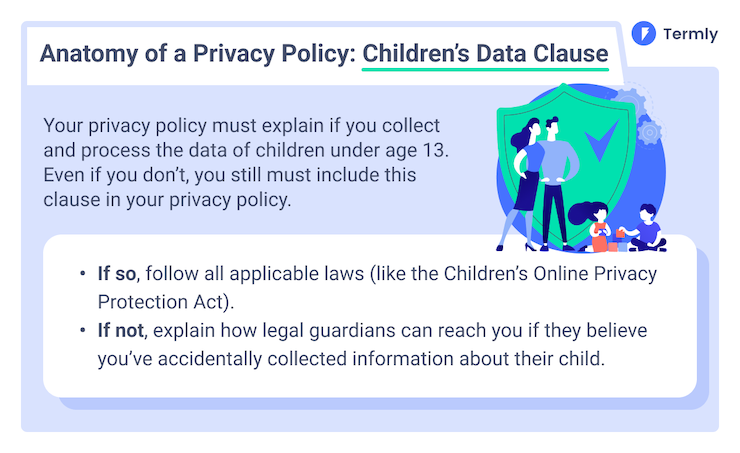
Many U.S. state level privacy laws require websites to honor browser settings and technology called universal opt-out mechanisms (UOOMs) as a verifiable consumer request to follow through on their various opt-out rights.
This includes opting out of having their data collected for the purposes of targeted advertising, the sale of their data, and the collection of sensitive personal data.
A good template will have space for you to add this information to your final privacy policy.
See more examples of what goes into this privacy policy clause in the graphic below.
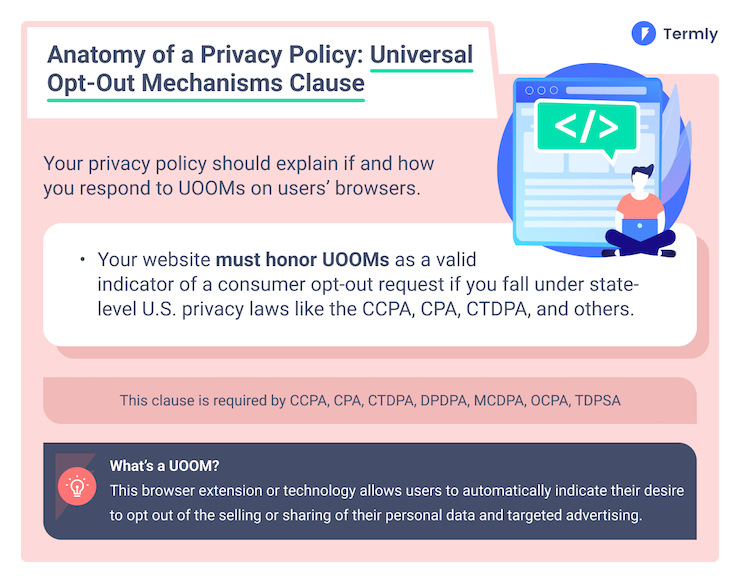
Finally, you should include a clause in your privacy policy that lists your company contact information — all templates should have space for you to do so.
As described in the graphic below, include at least your mailing address, customer support email, and phone number so consumers can easily reach you if they have questions or concerns or want to act on their privacy rights.
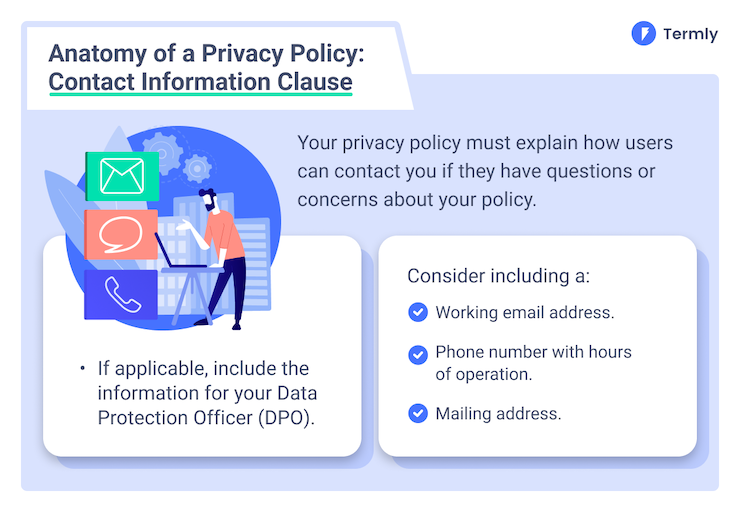
It’s a best practice to link to other legal policies in the clauses of your privacy policy template, as this makes it easy on consumers and ensures they have access to all necessary information.
For example, link to your cookie policy under the Cookies and Other Trackers clause in your privacy agreement.
You can even link to your privacy policy within those other legal documents, like your terms and conditions or disclaimer, this way you ensure your users can always find, access, and read all of your legal policies.
Once you’re done formatting your template, display your privacy policy in the following easy-to-find locations on your website, mobile app, or desktop app:
Good privacy policies are simple to read and easy to find on a website or app. Below we’ve gathered some privacy policy examples from larger companies to help inspire you as you work on your legal agreement.
The New York Times is a good sample of an easy-to-read, comprehensive, and well-organized privacy policy.
They include a clause explaining guidelines for children, and express that, in compliance with COPPA, their services are not direct to minors nor do they knowingly collect information from anyone under the age of 13.
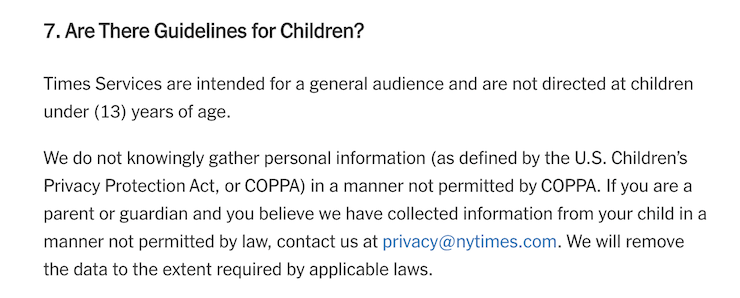
They even provide an email address so parents or guardians can easily request the deletion of any data accidentally gathered about a minor, which makes addressing privacy concerns much easier for the company and the client.
Another good sample privacy policy to consider comes from Apple.
As shown in the screenshot below, Apple clearly explains what personal data it collects from users in an easy-to-read bullet list.
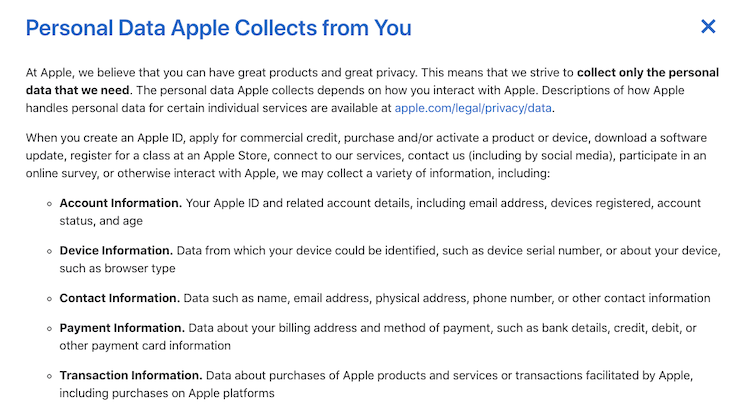
For legal compliance purposes, it’s important when using a privacy policy template that you write the details about your business in a way that’s easy for all users to read and understand.
One of the easiest ways to make your web privacy policy more user-friendly is to cut out the legalese — opt for clear and plain language instead.
If you’re reading this, you’re probably already aware that a privacy policy is a challenging legal document to make from scratch — this is why I recommend starting with privacy policy samples and templates, which are excellent free resources.
A major benefit to using a privacy policy template instead of writing your own privacy policy is that a ton of the writing is already done for you.
For example, we’ve pre-filled our free privacy policy template with the most common clauses, and left plenty of room for you to customize it in whatever way your business needs.
But if you’re short on time or want more hands-on guidance and support while working on your company’s privacy policy, try Termly’s Privacy Policy Generator.
Below, I answer some of the most frequently asked questions we get about privacy policies.
Yes, you need a privacy policy if you collect personal information and fall under any privacy laws, like the GDPR or CCPA.
A privacy policy is required by nearly every privacy law that exists, including all U.S. state-level privacy laws, the GDPR, and more.
Your privacy policy should include clauses about the information you collect from users, how and why you gather that data, how you use it, any third party you share it with, and what your users’ rights are over their data.
You need to update your privacy policy whenever your data processing activities change.
Under laws like the CCPA, you’re required to update your privacy policy once every 12 months.
No, do not copy someone else’s privacy policy.
Legal documents are copyrighted materials, and plagiarizing someone else’s policy won’t cover the individual needs of your business.
If you’re short on time, consider using our comprehensive Privacy Policy Generator.
Yes, when filled out accurately, privacy policy templates like ours can be enough for business owners, website owners, and app developers to make a privacy agreement that adheres to relevant privacy regulations.
If you collect personal information from your users, you must publish a privacy policy to comply with global data privacy laws and regulations.
Plus, posting one shows consumers they can trust your business with their personal data, which helps build trust and brand loyalty.
You can easily make one by using a simple privacy policy template that includes clauses for you to customize with details about what data you collect, how it’s stored, who it’s shared with, and what rights the user has over their information.
Now that you’re ready to get started, download our free sample privacy policy template and tailor it to your business needs.
If you’re looking for a different type of privacy policy template, have a look at our other options to find what you need:
| Privacy Policy | Description |
| GDPR Privacy Policy | A GDPR-ready privacy policy for any online business. |
| Mobile App Privacy Policy | A privacy policy for apps on the App Store and Google Play. |
| Ecommerce Privacy Policy | A privacy policy built specifically for online eCommerce stores. |
| Email Marketing Privacy Policy | A privacy policy for email newsletters and email marketing. |

Masha is an Information Security and Data Privacy Specialist and a Certified Data Protection Officer. She has been a Data Protection Officer for the past six years, helping small and medium-sized enterprises achieve legal compliance. She has also been a privacy compliance mentor to many international business accelerators. She specializes in implementing, monitoring, and auditing business compliance with privacy regulations (HIPAA, PIPEDA, ePrivacy Directive, GDPR, CCPA, POPIA, LGPD). Masha studied Law at Belgrade University, and she passed the Bar examination in 2016. More about the author